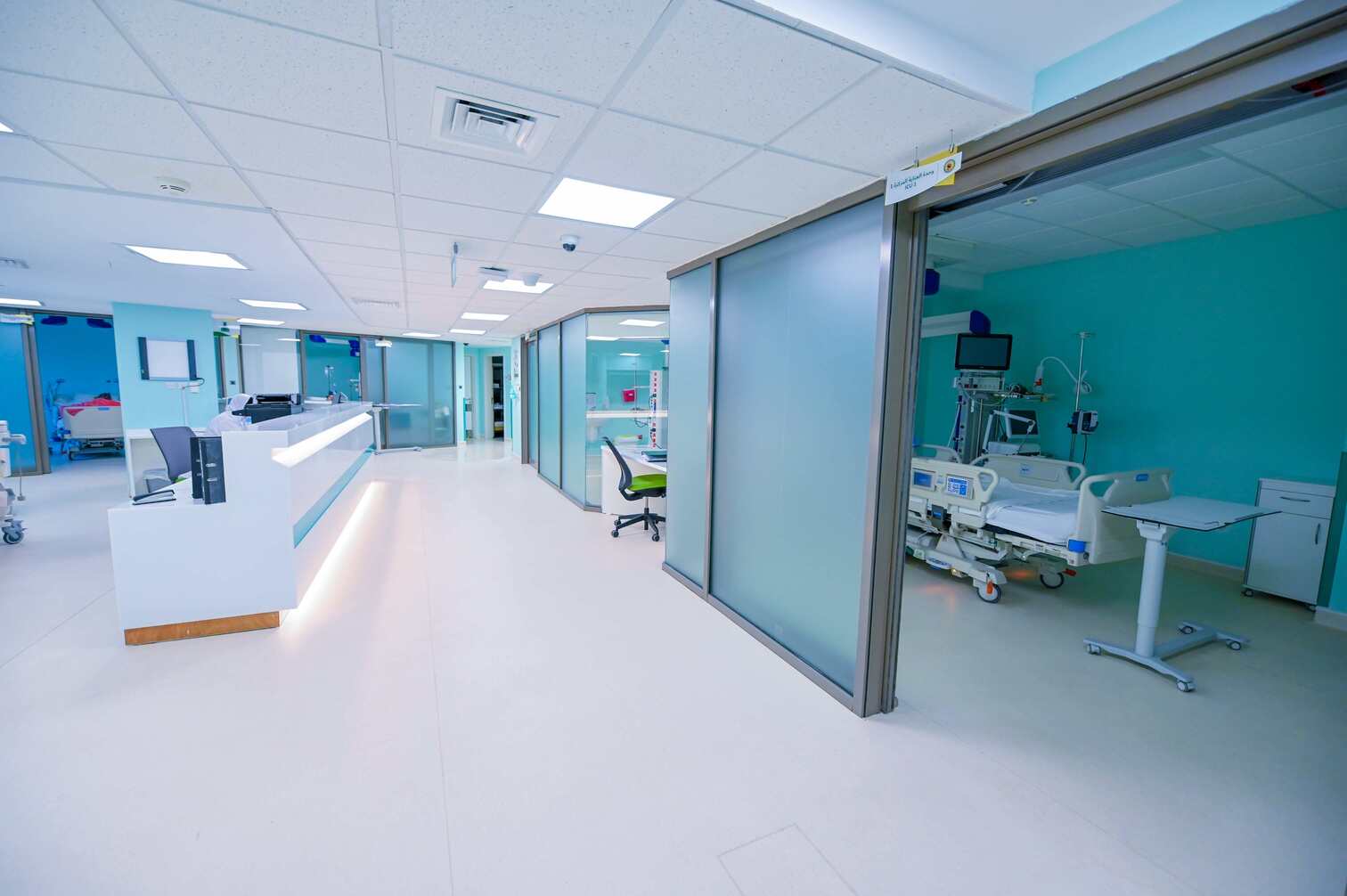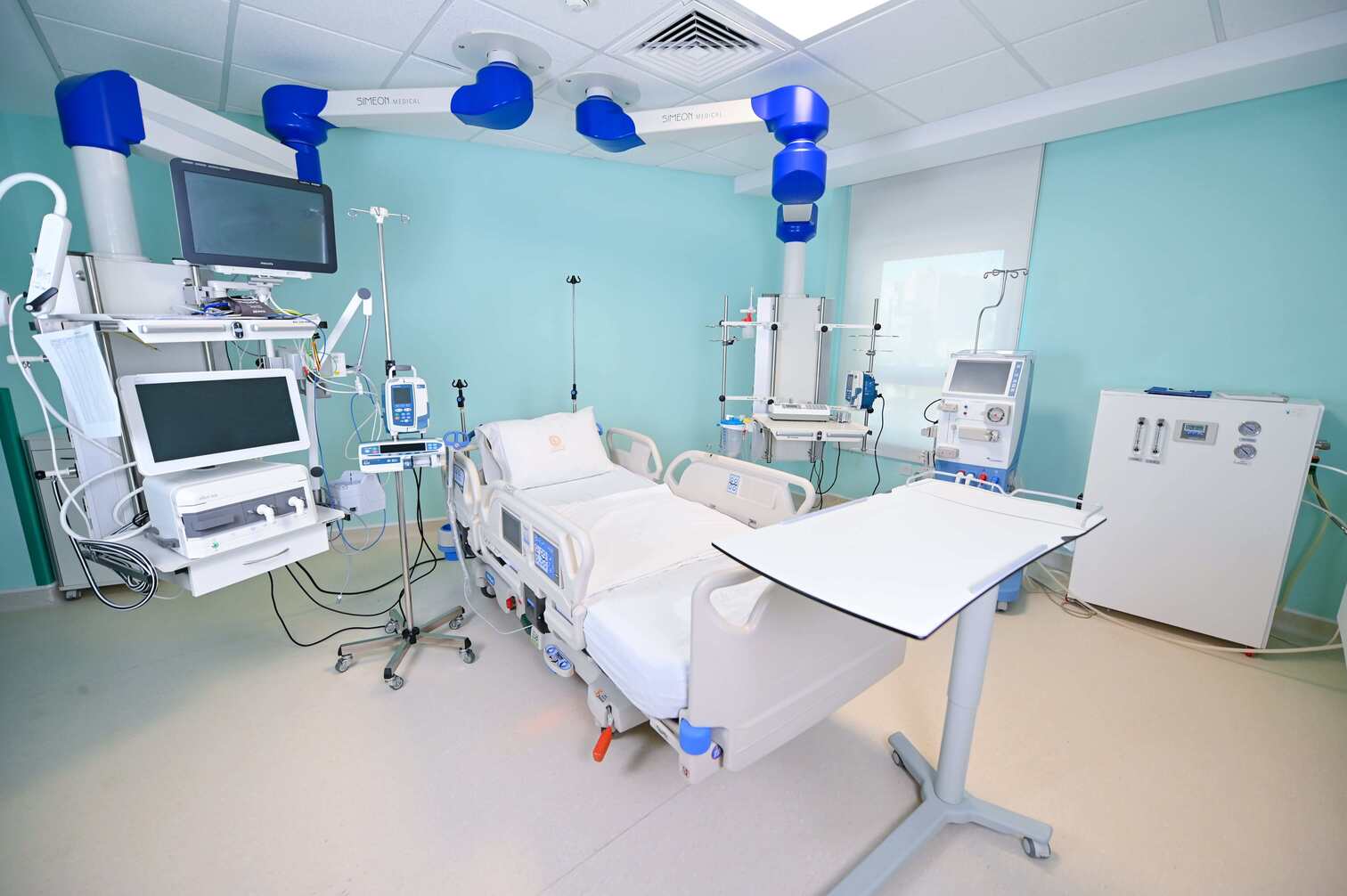Intensive care unit (ICU)
Patients need to be admitted to the Intensive Care Unit (ICU) when their health is critical and require constant and sustained follow-up for fear of deterioration, and in case of a patient that could develop more complex side complications and his life will be at risk.
When patients are admitted to an intensive care unit, it is normal for their family to be afraid of their potentially critical condition and need to feel assured about their patient’s health.
When we put ourselves in the place of the patient and his family, we begin to think about all the details not only medically but also humanly.
The Intensive Care Unit at Al Kindi Hospital is one of the most sensitive and important departments as it provides high-quality life-saving medical services for critical patients and is dedicated to cases requiring constant monitoring and intensive treatment.
The Intensive Care Unit (ICU) receives patients after various surgeries such as catheterization operations and complex serious injuries such as fainting, strokes as well as internal medicine conditions and pediatric patients.
Critical cases are assisted at the Hospital by the Department of Operations and Emergency, and admitted to the Intensive Care Unit to provide integrated clinical treatment under the supervision of the most qualified doctors and nursing staff, as the department is equipped with the latest technologies and advanced devices within the highest specifications and special standards by following the conditions of safety and prevention for patients.
Medical and nursing staff in the Intensive Care Unit
Nursing staff are distributed to intensive care patients based on the highest scientific expertise and qualifications due to the seriousness of the patient’s health situation.
The medical and nursing staff in the intensive care unit work in accordance with international quality standards to control infection, in addition to following up laboratory tests, surveillance devices and nursing fluids and following up on everything that comes out of the patient through the tubes of the urinary catheter and post-operative drainage tubes.
Doctors and nursing staff follow the patient daily and develop a treatment plan so that the patient is in better health which allows him or her to move from the intensive care unit to his or her own room.
- One nurse is assigned to care for one or more patients in the intensive care unit to meet their needs and care in particular.
- An integrated nursing staff of certified nurses is available to care for patients and provide outstanding clinical care.
- Doctors cooperate with nursing staff during the morning rounds daily to follow up on patients’ cases, check their health and follow up on the results of laboratory and clinical tests and x-rays and MRI scans of each patient.
- The ICU doctor supervises the patient’s condition in cooperation with other departments such as the department of radiology and pharmacy in accordance with international health quality policies and standards in order to ensure the safety of patients.
- The dietitian also visits the patient in the intensive care unit to determine the patient’s nutritional needs and how food should be delivered to them. The most appropriate feeding method for some patients may be through a thin tube that enters from the nostril and descends into the intestines and if the patient’s stomach does not accept food, it is fed intravenously which is called Total parenteral nutrition (TPN).
Features of the Intensive Care Department at Al Kindi Hospital
- The Intensive Care Department is equipped with the latest advanced medical devices and medical and nursing staff of holders of scientific certificates and trained to provide high quality medical care to patients in various cases.
- The nursing staff in the department is one of the most skilled crews that the hospital seeks to subject to training programs within the quality of clinical care in the training department of al-Kindi Hospital.
- The section has 7 beds equipped with the latest surveillance devices, the department is connected to a monitoring system for all patients, and each room is separated to ensure privacy, control critical cases and control infection.


Services provided by the Intensive Care Unit:
The patient is admitted to different types of care units if he or she is seriously ill, needs intensive treatment and close monitoring, or is undergoing surgery. Intensive care can help patients recover better.
Most patients in the intensive care unit have serious problems in one or more organs; for example, some patients are unable to breathe spontaneously and naturally.
The Intensive Care Unit at Al Kindi Hospital provides health care to inpatient patients with any life-threatening diseases, such as:
- Acute infections.
- Liver or kidney failure.
- Respiratory failure.
- Serious injuries such as traffic accidents, strokes and high blood sugar.
- The unit also treats and monitors patients after complex surgeries, such as heart, lung and brain surgeries.
The intensive care unit is equipped with state-of-the-art medical devices that include:
- Cardiac Echo devices to monitor the heart measure the strength of the heart muscle and diagnose different types of heart diseases.
- Top quality ventilators.
- Cardiac defibrillator device to treat serious and non-serious cardiac disorders.
- A special device to lower the patient’s temperature after cardiopulmonary resuscitation and acute overheating.
- Performing a dialysis of patients within the department without having to be transferred to the dialysis unit for conditions requiring it to provide the greatest quality in health care.
- Isolation rooms: The intensive care unit has 3 negative pressure isolation rooms to receive and control infectious conditions efficiently.
Guidelines for ICU patient visit:
- No more than one visitor is allowed at the same time.
- Children under the age of 12 are not allowed in ICU except in very special cases.
- It is strictly forbidden to bring flowers to the intensive care unit.
- People suffering from cold, symptoms of respiratory infection or other infectious diseases should not be in the intensive care unit.
- Visitors should take into account the patient’s privacy and be aware of the need to leave the room during the patient’s treatment.
- Do not sit on the patient’s bed, and please do not take pictures in order to preserve the patient’s privacy.
- Do not speak aloud during the visit, and avoid any disturbing behavior of other patients.
- Do not bring food or drinks during your patient’s visit. Do not give any food to the patient without telling the medical staff.
- Hand hygiene is very important in the intensive care unit. Wash your hands or use alcohol disinfectant in ICU admission areas.
- A family member is allowed to be present as a patient’s escort at all times, except in the case of patients in the isolation unit.
Mission
- The Intensive Care Unit at Al Kindi Hospital is committed to improving the health of our patients by providing specialized medical and nursing care by highly trained staff using the latest technological equipment available.
- Care is provided in a compassionate manner that takes into account the value of the individual and the importance of his or her health by meeting his or her own health needs.
- We are committed to maintaining the highest level of critical care expertise to meet the diverse needs of raising the level of intensive medical care in our community.
- We pride ourselves on our collaborative relationships with our patients, their families and all the services that are involved in restoring health and wellness to our patients.


